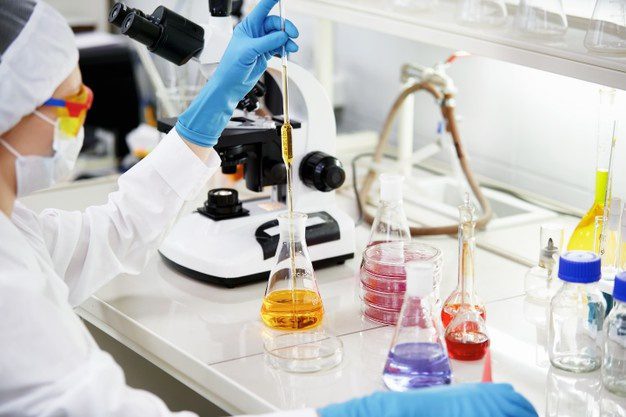In this article we will discuss various branch of chemistry. The branch of chemistry is divided into several branches including Analytical Chemistry, Physical Chemistry, Organic Chemistry, Thermochemistry, Geochemistry and others. You can learn various branches of chemistry in the following review.
In addition to the branch of physics and biology, chemistry is also a part of the natural sciences.
Chemistry is the study of the composition, structure, changes and properties of a substance.
Chemistry Branch
Currently, there are many that include chemistry, so they are grouped into several branches of chemistry. The following are some of the branches of chemistry that exist, namely:
1. Analytical Chemistry

Analytical chemistry is a branch of chemistry that studies the analysis of chemicals.
Examples include how to separate or identify the types of constituent substances and their amounts, grouping of substances and the formation of new substances.
Analytical chemistry is divided into two parts, namely qualitative analysis and quantitative analysis.
2. Physical Chemistry
Physical chemistry is a branch of chemistry that studies the relationship between the concepts of chemistry and physics.
Examples such as the occurrence of chemical reactions, the separation between two compounds, changes in chemical compounds, energy calculations and determination of the properties of a substance.
In addition, in physical chemistry, you will find many mathematical equations and calculations related to energy.
3. Organic Chemistry
Organic chemistry is a branch of chemistry that studies chemicals such as the synthesis or properties of organic compounds.
The nature of these organic compounds consists of hydrocarbon compounds and their derivatives.
Organic chemistry also has a role in the synthesis of compounds and research on other carbon atoms.
4. Inorganic Chemistry
Inorganic chemistry is a branch of chemistry as opposed to organic chemistry, which studies the synthesis and properties of inorganic compounds, such as salts, minerals and metals.
Inorganic chemistry also studies the separation of inorganic compounds, mineral processing and crystal formation.
In its use, inorganic chemicals are often used for the glass, textile, plastic and paint industries.
5. Environmental Chemistry

Environmental chemistry is a branch of chemistry that studies the chemistry and biochemistry that occurs in nature or everything that happens in the environment.
Chemistry is also a science that includes atmospheric, aquatic and soil chemistry so that chemistry is often associated with environmental pollution and how to overcome it.
In addition, environmental chemistry is highly dependent on other branches of chemistry, such as analytical chemistry.
6. Core Chemistry
Nuclear chemistry or often referred to as radiochemistry is a branch of chemistry that studies radioactive substances, the structure of the atomic nucleus and its influence on nuclear stability and reactions in the decay process of radionuclides and nuclear transmutation.
7. Biochemistry
Biochemistry is a branch of chemistry related to the branch of biology.
In biochemistry, you will learn about the chemical processes that occur in the body of living things and the analysis of the compounds involved.
In addition, biochemistry is related to genetic research, the chemical components of cells, as well as research on reactions in the bodies of living things.
8. Food Chemistry
Food chemistry is a branch of chemistry that studies chemical processes and interactions with biological components and improves the quality of food.
For example, a food product that undergoes changes due to the emergence of various food processing methods so how to improve or prevent changes.
9. Pharmaceutical Chemistry

Pharmaceutical chemistry is a branch of chemistry that studies the development of materials containing drugs based on quantitative and qualitative analysis of chemical compounds, both organic and inorganic.
10. Complex Chemistry
In chemistry, a complex or coordination compound refers to a molecule or entity formed by the joining of a ligand and a metal ion. Previously, a complex meant the reversible association of molecules, atoms, or ions through weak chemical bonds. This understanding has now changed. Some metal complexes are formed irreversibly and many of them have fairly strong bonds.
11. Geochemistry
Geochemistry is the science that uses chemical principles and technologies to analyze and explain the mechanisms behind geological systems such as the Earth’s crust and the oceans above it. The scope of geochemistry extends beyond the geo (earth), covers all rock movement systems in the solar system and has an important contribution in understanding the processes behind mantle convection, planet formation, to the origin of rocks such as granite and basalt.
12. Stereochemistry
Stereochemistry, a branch of chemistry, involves the study of the relative spatial arrangement of the atoms that make up the structure of molecules and their manipulation. An important branch of stereochemistry is the study of chiral molecules
13. Electrochemistry
Electrochemistry is a branch of physical chemistry that studies the electrical aspects of chemical reactions. Elements used in electrochemical reactions are characterized by the number of electrons they have. In general, electrochemical cells are divided into two groups, namely galvanic cells and electrolytic cells.
14. Material Chemistry
Materials chemistry is a branch of chemistry that studies organic, inorganic materials, and the structure of a chemical substance. There is a fundamental difference between matter which is known in chemistry and the term material which is used in materials chemistry. Chemistry studies the properties of matter, both intensive and extensive. However, in material chemistry, the properties of matter are studied so that they can be used for certain functions. For example, certain properties of metalloid elements (silicon, germanium, and arsenic) that can be used as semiconductor materials.
15. Thermochemistry
Thermochemistry is a branch of chemistry that studies the energy that accompanies physical changes or chemical reactions. The main objective of thermochemistry is the establishment of criteria for determining the probability or spontaneity of the required transformation. In this way, thermochemistry is used to estimate the energy changes that occur in chemical reactions, phase changes, and solution formation. Most of the features in thermochemistry develop from the application of the first law of thermodynamics, the law of ‘conservation’ of energy, to the functions of internal energy, enthalpy, entropy, and Gibbs free energy.
16. Polymer Chemistry
Polymer chemistry or macromolecular chemistry is a branch of chemistry that focuses on the chemical synthesis and chemical properties of polymers and macromolecules. According to IUPAC recommendations, macromolecules refer to individual molecular chains and are the domain of chemistry. Polymers describe the properties of polymeric materials and are a subfield of polymer physics as a subfield of physics.
17. Theoretical Chemistry
Theoretical chemistry is a branch of chemistry that deals with physics that studies and predicts chemical phenomena. Although not entirely precise, theoretical chemistry is often confused with quantum chemistry.
18. Mathematical Chemistry
Mathematical chemistry or mathematical chemistry is a branch of theoretical chemistry that uses mathematical functions to study chemical phenomena. Mathematical chemistry does not have to be related to quantum chemistry although most of the theories used relate to quantum mechanics or quantum chemistry, for example: group theory to explain the phenomenon of symmetry in molecules.
19. Quantum Chemistry
Quantum chemistry is a branch of theoretical chemistry, which applies quantum mechanics (and more recently quantum field theory) to dealing with problems in chemistry. The explanation of the behavior of electrons in atoms and molecules in terms of reactivity is one of the applications of quantum chemistry.
20. Computational Chemistry
Computational chemistry is a branch of chemistry that uses the results of theoretical chemistry which are translated into computer programs through computer simulations to calculate the properties of molecules and their changes as well as to simulate large systems (macromolecules such as proteins or systems of many molecules such as gases, liquids, solids). , and liquid crystals), and apply the program to real chemical systems.
Benefits of studying chemistry
- Digestion and burning of food substances in the body. Food comes from plants. Growing plants are assimilated by chemical processes. Our bodies need carbohydrates, proteins, fats, vitamins, all of which are chemical processes that can produce carbon dioxide gas, water and energy .
- In this life, we need soap, toothpaste, textiles, cosmetics, plastics, medicines, fertilizers, pesticides, fuels, paints, cooking spices, household utensils, even various types of processed foods, all of which are the result of application of chemistry. Almost all the materials we need, more or less, either directly or indirectly experience chemical touch. Try to pay attention.
Given the importance of the benefits of chemistry in life, it is not surprising that then chemistry continues to be developed. Various studies on anything continue to be done. Inventions continue to be born, it is all aimed at the lives of many people. In contrast to chemistry which tends not to be liked much, the benefits of chemistry are actually in demand and needed by humans themselves.
Everyone has their own view of chemistry and the benefits of chemistry for life. Some have a negative view, some accept its presence. Those with negative views are people who do not understand how important chemistry is in life, lack of knowledge can be the main cause.


